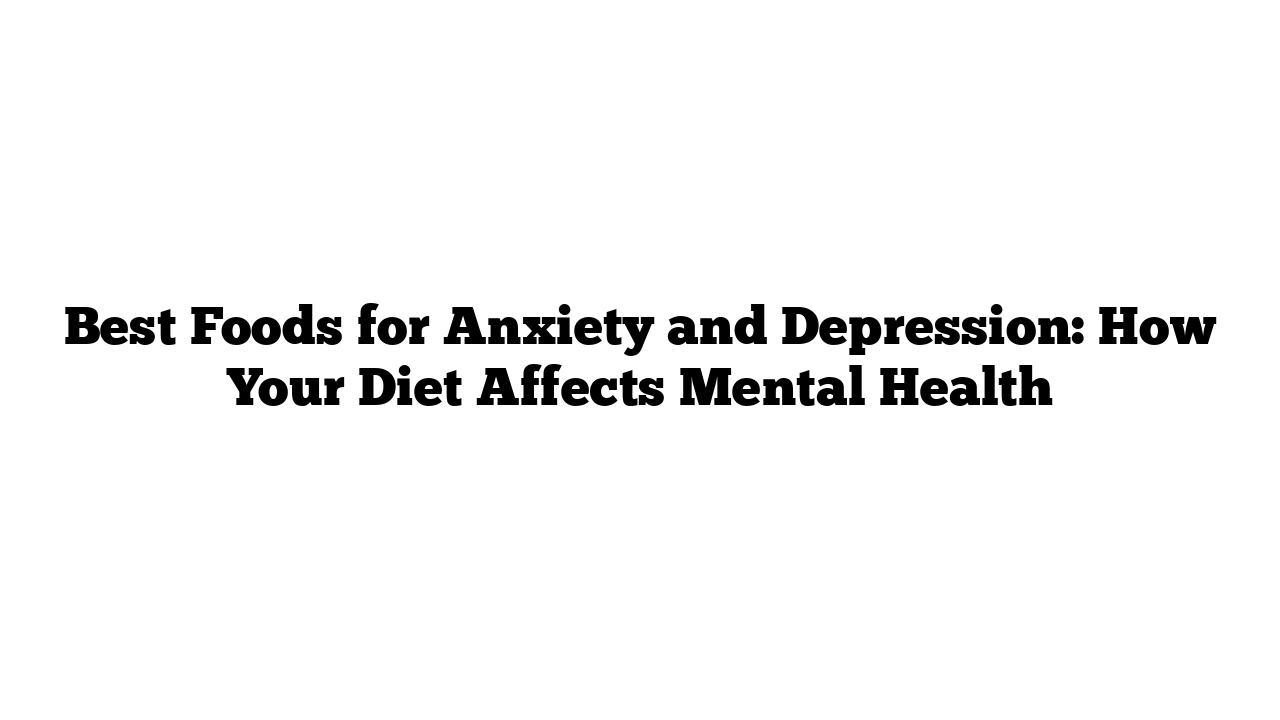Mental health, especially anxiety and depression, is an increasing concern, particularly in the U.S. Anxiety, defined by persistent worry and nervousness, exists on a spectrum and can affect people in varying degrees. While it’s important to consult professionals for proper diagnosis and treatment, research indicates that diet plays a role in both anxiety and depression.
Many mental health issues, including anxiety and depression, are tied to poor brain health. Factors like neurotransmitter imbalances, chronic inflammation, oxidative stress, and gut health can contribute to mental health struggles. The gut-brain axis—how gut health influences brain function—is central in understanding how our diet impacts mental health. Serotonin, a neurotransmitter responsible for mood regulation, is largely produced in the gut, emphasizing the significance of gut health in mental well-being.
Here’s how you can use food to support brain health and potentially reduce anxiety and depression symptoms.
Foods to Avoid for Better Mental Health
Certain foods may worsen anxiety and depression. Limiting or avoiding these can help support your mental health:
- Alcohol: Alcohol is a depressant that disrupts sleep, causes blood sugar irregularity, and contributes to inflammation, all of which can worsen anxiety and depression symptoms. Moderation is key, but some experts suggest it’s best to avoid alcohol entirely for better brain health.
- Caffeine: While caffeine can provide a temporary mood boost, excessive consumption can lead to heightened anxiety, sleep disruption, and overstimulation of neurotransmitters, which can worsen symptoms. Consider limiting coffee or switching to lower-caffeine options.
- Refined Sugar: Excessive sugar intake can cause blood sugar spikes and crashes, contributing to mood swings and irritability. Studies show that high sugar intake can increase the likelihood of developing anxiety and depression over time.
- Refined Grains: Foods like white bread and pasta can negatively impact blood sugar levels and deplete essential B vitamins. Opt for whole grains to maintain stable blood sugar and mood.
- Processed Foods and Fast Foods: High in unhealthy fats and low in nutrients, these foods can contribute to inflammation and increase the risk of mental health issues like anxiety and depression.
- Trans Fats and Refined Oils: Found in many processed foods, these fats are linked to inflammation, which affects brain function and mood.
- Processed Meats: Deli meats, hot dogs, and similar processed items are loaded with preservatives that may trigger inflammation, migraines, and mood swings.
- Artificial Sweeteners and Additives: Common in sugar-free products, these can cause headaches and mood disorders in sensitive individuals.
Foods That Help Improve Mental Health
Incorporating these brain-boosting foods into your diet can support mental health and reduce anxiety and depression symptoms:
- Fatty Fish: Rich in omega-3 fatty acids, fatty fish like wild-caught salmon, tuna, and mackerel are crucial for brain health. Omega-3s reduce inflammation and support neurotransmitter function, helping alleviate anxiety and depression. Walnuts also provide plant-based omega-3s.
- Amino Acids: Protein-rich foods like meat, poultry, eggs, and dairy are sources of amino acids, which are vital for neurotransmitter production. Turkey and chicken, in particular, contain tryptophan, an amino acid associated with reduced anxiety.
- Probiotics and Fermented Foods: Gut health is critical for brain function. Probiotic-rich foods like yogurt, kimchi, kefir, and kombucha can improve mood and reduce anxiety by promoting a healthy gut microbiome.
- Vegetables and Fruits: Dark leafy greens and vegetables like shiitake mushrooms help nourish the gut and provide vital nutrients for mental health. Berries, especially blueberries, are rich in antioxidants that may reduce depression. Avocados provide healthy fats essential for brain function.
- Green Tea and Chamomile: Both beverages contain antioxidants and calming properties that may help reduce anxiety.
- Dark Chocolate: In moderation, dark chocolate has been linked to mood enhancement and anxiety reduction, thanks to its high antioxidant content.
The Bottom Line
A healthy diet filled with whole foods, plenty of plants, and less processed foods supports not just physical health but mental health too. It’s not about drastic changes; small steps—such as adding more fatty fish or cutting back on sugar—can go a long way. A balanced, nutrient-rich diet helps maintain a healthy brain, stabilize moods, and reduce anxiety and depression symptoms over time.
FAQs
Q1: Can I treat anxiety and depression solely with diet? A1: Diet plays an important role in supporting mental health, but it should be part of a holistic approach. Therapy, medication, and lifestyle changes are also crucial for managing these conditions.
Q2: Are there any quick fixes for reducing anxiety with food? A2: While no food will provide instant relief, consistently incorporating brain-boosting foods like fatty fish, vegetables, and probiotics can help alleviate symptoms over time.
Q3: How much of these foods should I eat? A3: Focus on making gradual changes. For example, aim to have fatty fish 2-3 times a week or introduce more vegetables and fruits into your meals daily. Moderation is key for both beneficial and less healthy foods.
For more on this topic, check out these additional resources:
